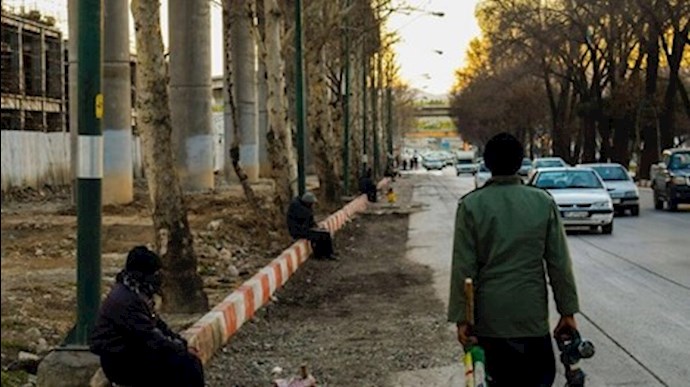Analysis by PMOI/MEK
Iran, May 24, 2021—According to the latest government-backed polls in Iran, the majority of the people will not participate in the upcoming sham presidential election—and the regime’s Guardian Council, the body that oversees the elections, doesn’t see this as a problem. Neither does it consider the election illegitimate. This means that the regime only wants to pass this sharp curve, even with the fewest votes.
In their infighting and rivalries for the presidency and power, regime officials and their affiliated media are making are making statement that shed light on government corruption that has resulted in the miserable living conditions of the Iranian people.
Ali Saadooni, a government economist, says, since 1990, many world economists’ estimates emphasized the significant growth of the Iranian economy in parallel to similar growth in South Korea and Turkey. Over the years, the forecasts for South Korea and Turkey have turned out to be relatively true. ButIran’s economic situation is in stark contrast to what everyone expected at that time. Saadouni considered the young population of the country in those years as the source of positive developments that were later lost. Iran could have had more than 10 percent economic growth for many years to come. “Not only did it not happen, but Iran became one of the manifestations of economic failure around the world. Thus, while Iran had high growth potential, in practice we had the weakest economic performance,” Saadouni said, according to a May 19 report by the Tejarat daily.
Shrinking capital and money-pumping policies
Ali Saadooni emphasized that incorrect economic policymaking has had a far greater negative impact than sanctions. During these years, the situation has deteriorated, there has been a noticeable decline in the investment rate in Iran, so that during a decade, the growth rate of capital formation has been negative. In 2020, the rate of capital generation dipped below the depreciation rate, and it is estimated that this process will continue this year.
In a May 18 article, the Bazar daily warned that even a possible opportunity caused by nuclear negotiations would not save the economy. “If in this situation, officials adopt the policy of pumping dollars into the market like 50 years ago, a reduction in the exchange rate to 150,000 rials per dollar is possible (current exchange rate is around 230,000 rials per U.S. dollar). The country’s foreign exchange reserves are estimated at $50-60 billion. If these reserves are wasted as in previous years, the exchange rate can be controlled in the country for several years (maximum 3 years), but the country’s foreign exchange reserves are lost, and the 50-year-old Dutch disease of Iran’s economy becomes more chronic,” the article reads in part.
Golden signatures
Another problem that Iran’s economy faces is that the ruling gangs simply can’t get on the same page. Regime officials and institutions are jockeying to gobble up what little remains of the people’s assets, capitals and property in different parts of the country. The Vice Chairman of the Special Commission for Production Leap said in a parliament session that, after a lot of research, they have found that one of the obstacles to production and development is the “golden signatures” in government departments and ministries that prevent new businesses from taking shape, and discourage investors from investing or even cause them to instead invest in neighboring countries.
Interestingly, in this regime, the existence of government Mafia has become so common and it seems that these gangs are not secret and do not operate in secret. “Golden signature makers are still in the economy, and despite the promises of economic policymakers, there is still a strange mafia that controls economic activities,” according to the Eskenas newspaper on May 19.
On May 19, the head of the trade commission of the Chamber of Commerce in Khorasan province said: “In the licenses of mines, factories and other industries, when the signature of an official is bought and sold for several billion rials, golden signatures create the mafia, and there is fundamental resistance to the removal of the licenses.”
This official further said: “The roots of rent and corruption in our economy are golden pens that block the growth of business and investment and add to economic and livelihood challenges. In the process of allocating government currency (for importing goods), we have repeatedly witnessed the destructive role of these pens and golden signatures. “If today the currency obtained from the export does not return to the country, the reason is in the same rental capacities.”
The tsunami of economic problems
On May 19, Eghtesad Online quoted Masoud Khansari, the head of Tehran’s Chamber of Commerce, as saying: “The biggest challenge in the next four years will be the economy, and if the candidates were aware of these challenges, they might not have registered that many. In the last 16 years, 10 million people have been added to the working age group, but the useful employment rate has increased by only 3 million. What is the candidates’ plan for the issue? Social capital has collapsed, which also affects the economy. Our 10-year average economic growth has been almost zero, so what is the candidates’ plan for each of the problems? We will have a lot of economic problems in the next four years. The problems that have been raised in the last ten years will overflow in the next four years.”
“The incentive to invest has decreased, and capital flight has increased, as has the transfer of capital to unproductive activities,” Khansari added.
With corruption being rampant across the regime, it is no wonder that the people have no desire to vote and choose one among several thieves that are running for presidency.





